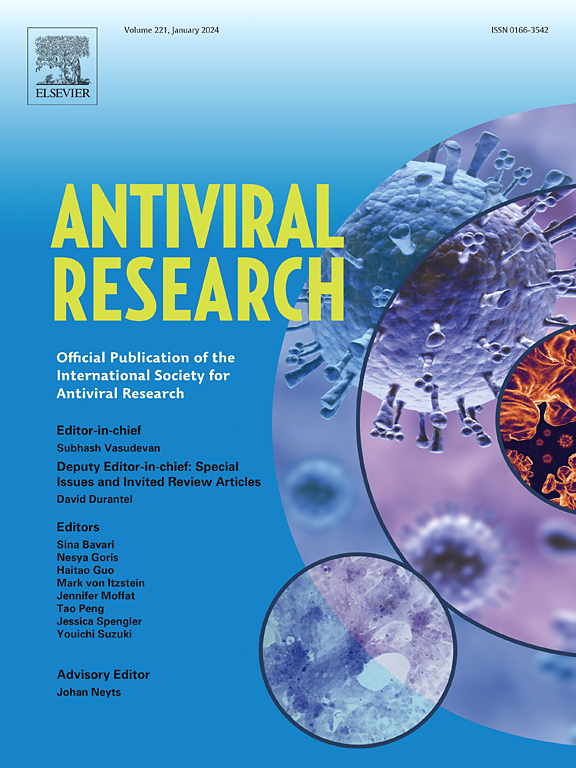Functional comparison of Fc-engineering strategies to improve anti-HIV-1 antibody effector functions
IF 4.5
2区 医学
Q1 PHARMACOLOGY & PHARMACY
引用次数: 0
Abstract
Substantial reduction of the intact proviral reservoir is essential towards HIV-1 cure. In vivo administration of broadly neutralizing antibodies (bNAbs) targeting the HIV-1 envelope glycoprotein (Env) trimer can decrease the viral reservoir, through Fc-mediated killing of infected cells. In this study, we compared three commonly used antibody engineering strategies to enhance Fc-mediated effector functions: (i) glyco-engineering, (ii) protein engineering, and (iii) subclass/hinge modifications in a panel of anti-HIV-1 antibodies. We found that antibody-dependent cellular phagocytosis (ADCP) was improved by elongating the hinge domain and switching to an IgG3 constant domain. In addition, potent NK cell activation and ADCC activity was observed for afucosylated antibodies and antibodies bearing the GASDALIE mutations. The combination of these engineering strategies further increased NK cell activation and induced antibody dependent cytotoxicity (ADCC) of infected cells at low antibody concentrations. The bNAb N6 was most effective at killing HIV-1 infected cells, likely due to its high affinity and optimal angle of approach. Overall, the findings of this study are applicable to other antibody formats, and can aid the development of effective immunotherapies and antibody-based treatments for HIV-1 cure strategies.
改善抗 HIV-1 抗体效应器功能的 Fc 工程策略的功能比较。
大量减少完整的病毒库对治愈 HIV-1 病毒至关重要。在体内使用针对 HIV-1 包膜糖蛋白(Env)三聚体的广谱中和抗体(bNAbs)可以通过 Fc 介导的对感染细胞的杀伤来减少病毒库。在这项研究中,我们比较了三种常用的抗体工程策略来增强 Fc 介导的效应功能:(i) 糖工程,(ii) 蛋白工程,(iii) 在一组抗 HIV-1 抗体中进行亚类/铰链修饰。我们发现,通过拉长铰链结构域并改用 IgG3 恒定结构域,抗体依赖性细胞吞噬作用(ADCP)得到了改善。此外,我们还观察到afucosyl化抗体和带有GASDALIE突变的抗体具有强效的NK细胞激活和ADCC活性。这些工程策略的结合进一步提高了NK细胞的活化,并在抗体浓度较低时诱导了感染细胞的抗体依赖性细胞毒性(ADCC)。bNAb N6 能最有效地杀死 HIV-1 感染细胞,这可能是由于它的高亲和力和最佳接近角度。总之,这项研究的结果适用于其他抗体形式,有助于开发有效的免疫疗法和基于抗体的治疗方法,从而达到治愈 HIV-1 的目的。
本文章由计算机程序翻译,如有差异,请以英文原文为准。
求助全文
约1分钟内获得全文
求助全文
来源期刊

Antiviral research
医学-病毒学
CiteScore
17.10
自引率
3.90%
发文量
157
审稿时长
34 days
期刊介绍:
Antiviral Research is a journal that focuses on various aspects of controlling viral infections in both humans and animals. It is a platform for publishing research reports, short communications, review articles, and commentaries. The journal covers a wide range of topics including antiviral drugs, antibodies, and host-response modifiers. These topics encompass their synthesis, in vitro and in vivo testing, as well as mechanisms of action. Additionally, the journal also publishes studies on the development of new or improved vaccines against viral infections in humans. It delves into assessing the safety of drugs and vaccines, tracking the evolution of drug or vaccine-resistant viruses, and developing effective countermeasures. Another area of interest includes the identification and validation of new drug targets. The journal further explores laboratory animal models of viral diseases, investigates the pathogenesis of viral diseases, and examines the mechanisms by which viruses avoid host immune responses.
 求助内容:
求助内容: 应助结果提醒方式:
应助结果提醒方式:


